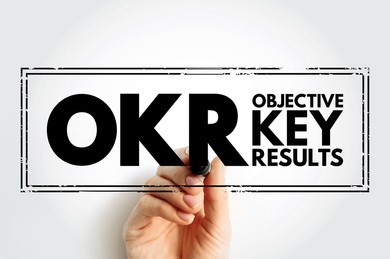Every successful leader knows that achieving big goals requires clear direction and effective strategies. Goal-setting is a powerful tool, helping leaders create focus, drive motivation, and establish a shared vision. In this guide, we dive into essential reads on OKRs (Objectives and Key Results) and goal-setting, helping leaders sharpen their strategies, align team efforts, and track meaningful progress.
Understanding the Fundamentals of OKRs
What Are OKRs?
OKRs, or Objectives and Key Results, are a goal-setting framework that breaks down ambitious objectives into actionable key results. This framework enables teams to define specific goals (Objectives) and measure their progress with quantifiable outcomes (Key Results).
Brief History and Origin of OKRs
Originating in the tech industry, OKRs were popularized by Andy Grove at Intel and later embraced by Google. Since then, countless companies across industries have adopted OKRs, recognizing their value in maintaining a focused and collaborative team environment.
Benefits of Using OKRs for Goal-Setting
The OKR framework provides clarity, aligns goals across teams, and keeps everyone moving toward a common purpose. Leaders, in particular, benefit from using OKRs as they set a roadmap for success and help align individual contributions with organizational goals.
The Importance of Goal-Setting for Leaders
Why Leaders Need Effective Goal-Setting Strategies
Effective goal-setting creates a clear sense of purpose. For leaders, it’s essential to not only have a vision but to break that vision down into actionable steps. This approach fosters team alignment, boosts productivity, and inspires continuous improvement.
How Goal-Setting Aligns Team Focus and Purpose
When goals are clearly communicated, every team member understands their role in the bigger picture. Leaders who prioritize effective goal-setting cultivate a culture of accountability and motivation, ultimately driving success.
Key Characteristics of Effective OKRs
Clarity and Specificity
An effective OKR is easy to understand and laser-focused. Clear objectives help teams stay aligned, while measurable key results ensure progress is trackable.
Measurable Results
Key Results should be quantifiable, providing a concrete way to measure success. This approach offers teams a sense of accomplishment as they see progress toward specific milestones.
Ambitious Yet Achievable Goals
OKRs encourage leaders to set high-reaching objectives that push the team to excel without being unattainable. A good balance between ambition and realism keeps teams motivated and engaged.
Top Books on Goal-Setting for Leaders
To excel in goal-setting, leaders can benefit from insights provided by leading thinkers. Here are some Best book on OKR that explore effective goal-setting strategies and implementation.
“Measure What Matters” by John Doerr
John Doerr’s book is often considered the Bible of OKRs. It introduces the fundamentals of OKRs, offering valuable insights on how to implement this system. Leaders learn how to set inspiring objectives and track meaningful results, making this book essential reading for any goal-driven leader.
“The OKR Book” by Ben Lamorte
Ben Lamorte provides a practical guide to implementing OKRs. With frameworks that simplify OKR adoption, this book is packed with hands-on strategies, making it an excellent choice for leaders seeking actionable advice on integrating OKRs into their organizations.
“High Output Management” by Andrew Grove
Andrew Grove’s classic book provides a roadmap for improving productivity and efficiency. Known as one of the founding figures of OKRs, Grove delves into the connection between goal-setting, team management, and measurable results, making this a timeless read for leaders.
“Radical Focus” by Christina Wodtke
In “Radical Focus,” Christina Wodtke emphasizes simplicity and purpose in setting OKRs. Through engaging storytelling, Wodtke explores how to strike a balance between ambitious goals and practical execution, providing leaders with insights into sustainable growth.
“Built to Last” by Jim Collins and Jerry Porras
This book offers a broader perspective on long-term vision and goal-setting. By linking core values to OKR frameworks, “Built to Last” shows leaders how to design goals that withstand the test of time and foster a lasting impact on organizational culture.
“The One Thing” by Gary Keller and Jay Papasan
With a focus on prioritization, “The One Thing” encourages leaders to zero in on their most important objective. This approach complements OKRs by simplifying complex goals into single, achievable steps, perfect for leaders managing multiple priorities.
Applying Insights from OKR Literature to Leadership
By learning from these essential reads, leaders can implement powerful goal-setting strategies that drive results. These books offer frameworks and principles that can be adapted to fit various industries, making them invaluable resources.
Common Challenges in Goal-Setting and How to Overcome Them
Implementing OKRs can be challenging, especially for leaders new to this framework. Common obstacles include setting overly ambitious goals, lacking team buy-in, or failing to adapt to change. Overcoming these challenges requires a balance between flexibility and accountability.
The Role of Continuous Learning in Effective Goal-Setting
For leaders, continuous learning is key to staying effective. Regularly revisiting resources, staying updated on goal-setting strategies, and experimenting with new approaches can help leaders refine their OKR process and stay aligned with industry trends.
Conclusion
Goal-setting is the backbone of effective leadership. By exploring and applying insights from top books on OKRs and goal-setting, leaders can create a roadmap to success. With frameworks that balance ambition with practicality, these reads help leaders inspire their teams, track progress, and celebrate wins along the journey.
FAQs
1. What are OKRs in goal-setting?
OKRs, or Objectives and Key Results, are a framework that helps teams set specific objectives and track progress through measurable results.
2. How can OKRs benefit leaders?
OKRs help leaders clarify goals, align team efforts, and create accountability, fostering a focused and goal-oriented culture.
3. Why is “Measure What Matters” a must-read for leaders?
“Measure What Matters” offers actionable insights into OKR implementation, making it essential for leaders who want to drive success through goal-setting.
4. How can I start implementing OKRs with my team?
Start by setting clear objectives, defining measurable results, and regularly reviewing progress with your team for continuous improvement.
5. What is the main takeaway from “The One Thing” by Gary Keller?
“The One Thing” emphasizes the power of prioritization, encouraging leaders to focus on the most impactful goals for better results.



